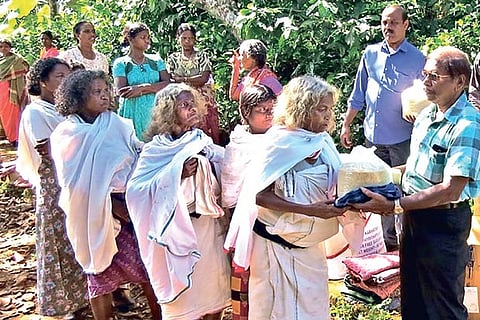

Chennai
“Due to COVID-19 pandemic, tribal people could not sell their produces and has thus lost their livelihood. It has forced them to expect help from NGOs and government. Once a self-sustaining population has now turned into a dependent population,” SS Davidson, Managing Trustee, Tribal Foundation, told DT Next.
Tribals are one of the most marginalised communities in the state forming just around 1 per cent of the total population. According to the data available with the state government, there are around 7 lakh tribal people in the state divided into 36 tribal communities.
Most of the tribal people in the state are cultivators, agriculture labourers or dependent on forests for their livelihood. However, in the last two months their livelihood had turned miserable due to COVID-19 pandemic.
The Tribal Foundation carried out a study among communities in Western Ghats about the impact of COVID-19. The study found out that the pandemic had completely turned the tribals dependent on resources outside their territory.
“Before COVID-19 tribal people faced problem in the form of man-animal conflicts due to which they could not completely rely on forest products for their livelihood. Now, due to the pandemic, their products such as raw cashew, rubber and honey could not be sold due to poor economic condition prevailing in the country,” said Davidson.
Earlier, a kilogram of raw cashew will be sold for Rs 140 per kg, but now none are ready to purchase them for Rs 50 per kg even. Similarly, rubber lattice does not fetch even the basic price due to which there is no job in the rubber plantations which is the primary job of tribals in their locality.
Apart from the pandemic, the Forest Department is another source of worry to the tribals. “In The Nilgiris, Forest Department officials force tribals not to go for banana plantations since the plant attracts elephants into human habitats. Similarly, there are several restrictions for raising honeybees for tribals from forest department,” said Dr Benjamin David, Treasurer, Tribal Foundation.
Benjamin also said that due to the restrictions from Forest Department tribals are forced to go as agricultural labourers which had hurt them during COVID-19 as a huge chunk of tribal population had lost their jobs in the pandemic.
“If the situation persists, we may have to see tribals migrating out of their traditional land and going as migrant labourers working for cheap labour,” said Benjamin.
Visit news.dtnext.in to explore our interactive epaper!
Download the DT Next app for more exciting features!
Click here for iOS
Click here for Android